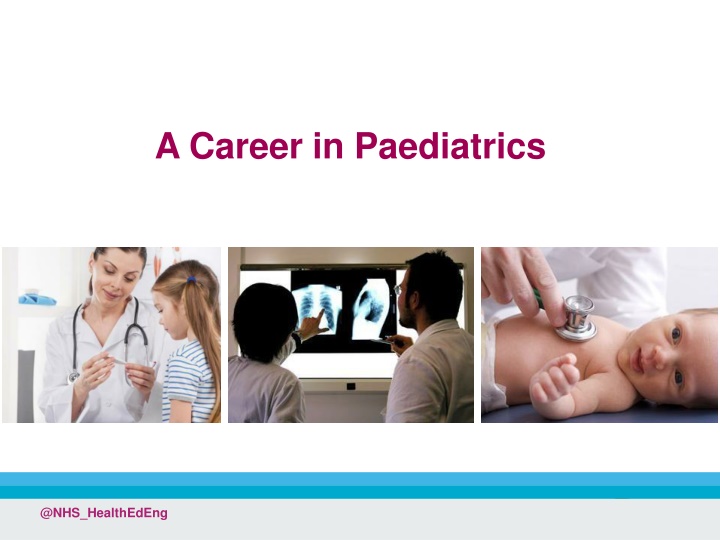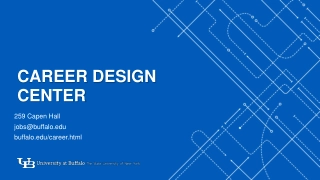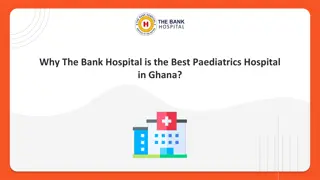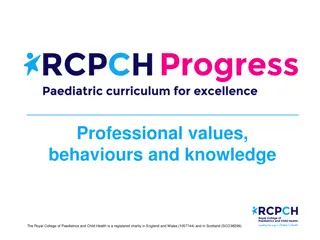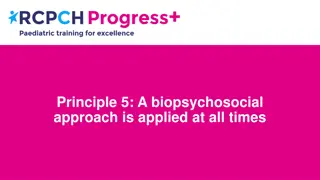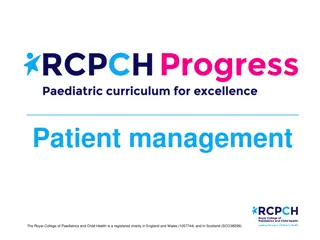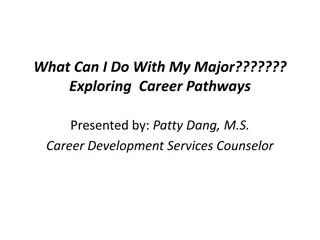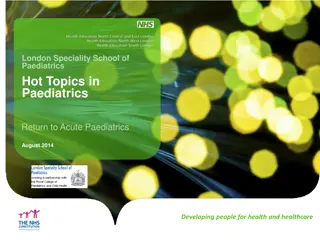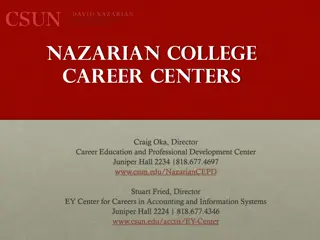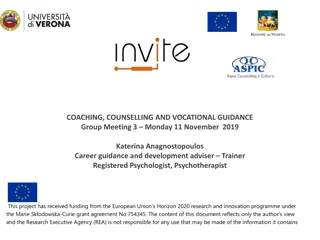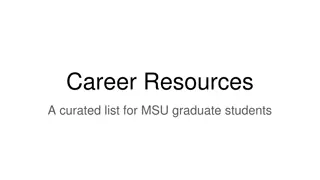A Career in Paediatrics
Paediatrics is a varied specialty focusing on children from birth to 16 years old. Discover the challenges, job satisfaction, and specific knowledge required for this rewarding career. Explore why paediatrics might be the right path for you within the NHS system.
Download Presentation

Please find below an Image/Link to download the presentation.
The content on the website is provided AS IS for your information and personal use only. It may not be sold, licensed, or shared on other websites without obtaining consent from the author.If you encounter any issues during the download, it is possible that the publisher has removed the file from their server.
You are allowed to download the files provided on this website for personal or commercial use, subject to the condition that they are used lawfully. All files are the property of their respective owners.
The content on the website is provided AS IS for your information and personal use only. It may not be sold, licensed, or shared on other websites without obtaining consent from the author.
E N D
Presentation Transcript
A Career in Paediatrics @NHS_HealthEdEng
Contents Paediatric Overview Advantages / Disadvantages Career Pathway Recruitment Competition ratios Commitment to Specialty Further Information (Pleaseclick on topic fordirectlink) @NHS_HealthEdEng
What is Paediatrics? Varied o o 0-16 years - 400g to >70kg o Acute illness vs chronic lifelong conditions o They come with parents and families to deal with! Not just mini adults @NHS_HealthEdEng
Why Paediatrics? Very supportive speciality Wide range of specialtiesbut able to be a generalist if preferred. An excuse to play and know about Peppa Pig Paediatrics Smellsbetter than adult wards! Most children get better quickly Fast pace (Average inpatientstay = 23hours) @NHS_HealthEdEng
Job Satisfaction Get high proportion of patients completely better quickly Children are fun they tell it as it is! Paediatricians are approachable people who have a work life balance @NHS_HealthEdEng
Challenges Patients may weigh 400g to >70kg- i.e. your biggest patients could weigh 140x as much as your smallest! Facing challenging and difficult situations @NHS_HealthEdEng
Specific to Paediatrics Need to know about development Birth history Home environment Schooling Immunisations Safeguarding @NHS_HealthEdEng
Children and Illness Busy acute specialty with heavy on calls Consultant of the week system True 7 day service Children get sick very quickly but also get better quickly A virus gives an adult a cold but a small baby may have bronchiolitis and require ventilation. Many new challenges inborn errors of metabolism and illnesses you will never have met before always something new to learn. @NHS_HealthEdEng
Challenges Examining a screaming 2 year old Differentiating the viral illness from meningitis. Dealing with a 23 week pre term infant Practical procedures (in screaming children with anxious parents). Explanations in difficult situation @NHS_HealthEdEng
Paediatric Consultant: Typical Day Aday in the life Correspondence, emails and review of results Answering patient queries Writing reports Outpatient clinics either general or special interest Clinical and educational supervision Teaching trainees, medical students and medical staff Attending meetings Audit and clinical governance Consultant of the week all 10 sessions are for acute care on the wards/PAU @NHS_HealthEdEng
Advantages Variety of cases Subspecialty choice including hospital or community Team working environment Assessment unit Wards Neonatal unit Rewarding and Fulfilling Children get better quickly you make a difference Helping and explaining things to anxious parents Specialty with highest number of less than fulltime trainees. Part time consultant posts. Never boring @NHS_HealthEdEng
Disadvantages Stressful resuscitation scenes Dealing with deaths especially cot deaths and RTAs Children with life limiting conditions Long days/ Nights/ Weekends High intensity specialty Resident consultant posts Have to like all age of child from pre-term through to adolescents @NHS_HealthEdEng
Personal Qualities for a Paediatric Career Excellent communication skills flexible & age appropriate communication with anxious children and families.Acute speciality requires good team communication and handover. Good interpersonal skills essential to work in teams with peers, senior doctors, junior colleagues, nursing staff, allied health care professionals, administrative staff etc. Leadership required at all levels. Confidence to direct the team, decisive, calm under pressure and knowing when to call a senior colleague for help. @NHS_HealthEdEng
Personal Qualities for a Paediatric Career Resilience ability to cope mentally with stressful situations Practical skills drips, lumbar punctures, long lines, neonatal procedures Life long learner keeping up to date as new conditions, investigations and treatment emerge In line with all specialities, Paediatric trainees need to be reliable, self-motivated, punctual , flexible and good team players @NHS_HealthEdEng
Paediatric Training Pathway (until August 2023) @NHS_HealthEdEng
Paediatric Training Pathway (after August 2023) @NHS_HealthEdEng
Paediatric Training Level One Training: ST1- 4 Based in acute settings including o Emergency duties o Inpatient and outpatient experience o Neonates o Some primary care / public health / Child & adolescent mental health Can move to middle grade in ST3/4 Must have MRCPCH by end of ST4 @NHS_HealthEdEng
Paediatric Training Level Two Training: ST5-7 Usually 3 years but a minimum of 2 years General Paediatrics 24-36 months, may include 12 months in a subspecialty Or Sub-specialty Paediatrics 24-36 months depending on programme @NHS_HealthEdEng
Paediatric Training Between Level One & Two Training Can go straight from level 1 to 2 training Some trainees may want to take 12 months OOP to gain additional experience (e.g. subspecialty, overseas) @NHS_HealthEdEng
Opportunities for Subspecialisation Neurodisability Child Mental Health Gastroenteroloyand Hepatology Neonatology Emergency Medicine Respiratory Diabetes and endocrine SUBSPECIALITIES Oncology Nephrology Rheumatology Neurology Immunology, infectious diseaseand Allergy Metabolic medicine Palliative medicine PICU @NHS_HealthEdEng
Specialty Interest Modules (SPIN) Allergy Cardiology Dermatology Diabetes Epilepsy Gastroenterology High Dependency Care Infectious disease and immunology Nephrology Neurodisability Oncology Palliative Medicine Respiratory Rheumatology Young peoples health Safeguarding SPIN due shortly Usually spend 12 months completing SPIN modules in ST6-8 training You are then a general paediatrician with a special interest @NHS_HealthEdEng
Other Requirements During Training Work place based assessments (supervised learning events) e-Portfolio Life support courses; NLS, PLS,APLS Audit Presentations Publications Safeguarding courses Teaching Managerial experience Annual review of competence progression (ARCP) @NHS_HealthEdEng
Recruitment Recruitment is managed by the Paediatrics National Recruitment Office (Paeds NRO), working out of the HEE West Midlands office. For queries, please contact them at PaedsNRO@hee.nhs.uk. Recruitment is via the Oriel portal. ST1-2 applications open each November, closing early December. Interviews are in January. ST3-4 interviews inApril/May. applications open in January/February with @NHS_HealthEdEng
Recruitment In 2018/19 there was a round 1 rerun for unfilled posts. This opened in February with interviews in April. This may continue in future years. For entry at ST1/2 the vacancies are merged and there is no restriction on prior paediatric experience For applicants with 12m prior paediatric experience or more, there is the opportunity to proceed faster through level 1 training. @NHS_HealthEdEng
Recruitment All shortlisted applicants are invited to interview. Successful programme inAugust or September. candidates commence on the training Interviews for ST1/2 are conducted in regional centres across the UK, for ST3/4 they are conducted in a single centralised venue (in 2019 this was in Birmingham) There is a national scoring system and ranking of all posts @NHS_HealthEdEng
Competition Ratios 2019 ST1/2 Competition Ratios In 2019, 564 applications were made for 476 posts overall across the UK. 480 applicants were invited to interview. The competition ratio for paediatric postswas therefore 1 : 18 Some regions do prove more popular than others. However, applicants can preference any or all of the preferences for any or all regions,so it is not possible to give an accurate competition ratio by region. @NHS_HealthEdEng
Recruitment - Competition Ratio 2021 Competition Ratios @NHS_HealthEdEng
Personal Qualities Person Specification @NHS_HealthEdEng
West Midlands Specific One of the largest regions in the country Diverse area resulting in wide range of pathology. Mix of smaller DGHs, large teaching hospitals and tertiary units ensures broad training and excellent opportunities. 3 Medical schools oBirmingham University Birmingham Women s hospital and Birmingham Children s hospital oWarwick University University hospitals of Coventry and Warwickshire oKeele University University hospital of the North Midlands @NHS_HealthEdEng
West Midlands Specific Trainee representation on the School Board to continuously develop training opportunities Protected teaching programme tailored to each year of training including simulation training Opportunities to train in all Paediatric subspecialties within the region Transport links to the rest of the country and internationally Mix of stunning countryside and modern city life @NHS_HealthEdEng
East Midlands Specific Large region, but split into north & south zones reducing need to commute Diverse population resulting in wide range of pathology. Mix of small to large DGHs, large teaching hospitals and tertiary units offering a wealth of training. 4 Medical schools oUniversity of Nottingham oUniversity of Leicester oUniversity of Nottingham at Derby oUniversity of Lincoln @NHS_HealthEdEng
East Midlands Specific All levels of Trainee represented on the School Board ensuring the trainee voice is heard Protected teaching programme tailored to level of training including simulation training Opportunities to train in most Paediatric subspecialties Excellent transport links nationally & internationally Compact modern cities, historic towns & stunning countryside Links with Royal Childrens Hospital, Melbourne,Australia @NHS_HealthEdEng
Demonstrate your Commitment to Specialty Working with children o Community work (non-medical) o Medical student special study module/ Elective o Foundation year rotations o Foundation taster days Belonging to Paediatric medical student societies Audit related to children Research / publications/presentations Teaching Regional and national conferences Affiliate member of RCPCH Foundation Doctors @NHS_HealthEdEng
Where to go for more information Royal College of Paediatrics and Child Health NHS health careers Health Education England, East Midlands Paediatrics @NHS_HealthEdEng
